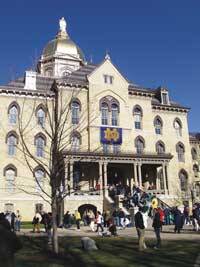The University of Notre Dame’s invitation to President Barack Obama to speak at its commencement in May—and the honorary degree it will bestow upon him—is the subject of the latest in a series of controversies that has fuelled a national debate on how Catholic colleges and universities should express their Catholic identities.
In Scranton, Pa., Bishop Joseph F. Martino engaged in a public dispute with the leadership of Misericordia University after a gay rights activist was invited to give a lecture there. At the University of San Francisco, some Catholics were angered by the decision to award Irish President Mary McAleese an honorary degree even though she has publicly supported gay rights and women’s ordination. Fordham University’s law school presented U.S. Supreme Court Justice Stephen G. Breyer with a prestigious ethics prize despite objections because of the justice’s votes to uphold the legality of abortion. And the University of San Diego revoked the faculty appointment of a theologian—Rosemary Radford Ruether—after learning that she was a member of the board of an organization that supports legal abortion. “It is a part of the continuing evidence that Catholic universities are becoming intellectual and cultural ghettos where the controversial issues cannot be discussed,” Ruether said following the revocation of her appointment.
Other Catholic intellectuals have expressed their concerns, and have defended their institution’s decisions. “We don’t see a conflict with our Catholic identity if we have a speaker on campus who may have views that are in conflict with Catholic teachings,” said Kristine Maloney, a spokeswoman for the College of the Holy Cross in Worcester, Mass. “We consider the contributions the speaker has made to society as a whole, and that doesn’t necessarily mean we endorse all of their positions or views. We’re committed to a Jesuit tradition, which doesn’t suppress educational issues and intellectual debate,” she said.
Patricia McGuire, president of Trinity Washington University, argued that Catholics have long struggled to make their colleges and universities the widely respected institutions that they are and not simply the agents of parochial concerns. “The diminishment of the idea of the university by [some critics] betrays two centuries of intellectual advancement and real leadership by Catholic higher education in this nation,” McGuire said.
David M. O’Connell, the Vincentian priest who is president of The Catholic University of America, said, however, that while Catholic educators should not fear views or positions contrary to Catholic teachings, they should be respectful of the church’s moral values. “We should be concerned when legitimate educational activity about such matters becomes advocacy or the perception of it,” Father O’Connell said. “Positions contrary to the church are not, cannot and should not be presented as equally valid to what the church holds or teaches on our Catholic campuses.”
Giving voice to a similar concern, Archbishop John J. Myers of Newark, N.J., said, “We cannot justify such actions, and the [U.S.] bishops have stated so clearly and strongly.” He cited the U.S. bishops’ 2004 document, “Catholics in Political Life,” which states that “the Catholic community and Catholic institutions should not honor those who act in defiance of our fundamental moral principles.”








